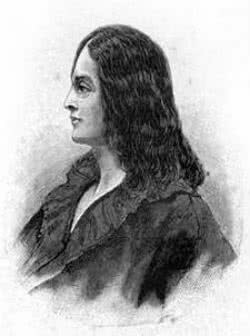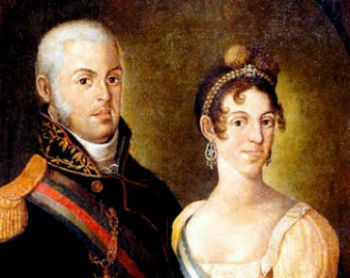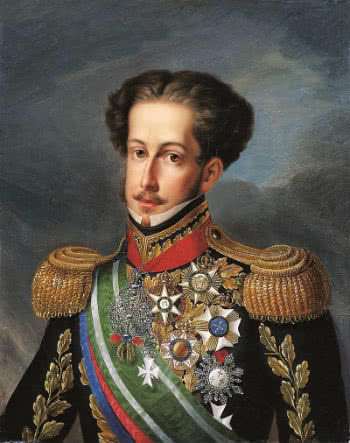Tiradentes, nicknamed Joaquim José da Silva Xavier (1746-1792), was one of the participants in the Inconfidência Mineira, a movement that aimed to proclaim the captaincy of Minhas Gerais as a Republic independent. Sentenced for treason, he was sentenced to death by hanging, being hanged in 1792, on April 21, Tiradentes Day.
As he was an excellent communicator, Tiradentes had the ability to win over followers. In search of more adhesions, Tiradentes traveled to Rio de Janeiro. At this time, however, the movement had been denounced by a participant and he hid in a friend's house, where he was found and arrested.
In prison he was appointed by the other participants as the leader of the movement, although this was not true. Even so, he took full responsibility and managed to protect his comrades.
Participants were sentenced to death, but had their sentences turned into exile. Only Tirantes was sentenced to death, because among the conspirators he was the one with the lowest military rank.
Tiradentes History
Tiradentes joined the movement called Inconfidência Mineira when he was in the military and had the rank of ensign. Being considered an excellent communicator he was responsible for winning adherents for the revolutionary cause.
The movement of the Inconfidência Mineira (or Conjuração Mineira) was articulated by contractors who feared the collection of debts, the Spill. It was an act of the Portuguese government, where all those who had debts with the Crown had to settle their accounts or have their property confiscated.
Thus, the contractors who had debts with Portugal got together and sought a solution to prevent this action.
Thus, during the meetings, it was decided that the best way to avoid abuses of authority was to transform Minas Gerais into a republic independent of Portugal. It was nothing new, since at that time the Enlightenment ideas that preached equality between peoples were circulating. Likewise, the United States had managed to emancipate itself from England, in 1774, precisely because it refused to pay more taxes.
The group of conspirators was composed of the Minas Gerais aristocracy and among them there were colonels, poets and lawyers, who outlined plans to take control of the Captaincy of Minas Gerais and abolish the fees imposed by the crown Portuguese.
In 1789, however, the movement was denounced by one of its members, Joaquim Silvério dos Reis. In return, he asked for forgiveness of his own debts and benefits for his family.
The authorities suspended the Spill, began to persecute the participants and they were arrested and tried.
Tiradentes' property was confiscated, his house burned and the earth salted - making it unsuitable for cultivation - a common punishment that the Portuguese Crown meted out to those convicted of treason.
Tiradentes was sentenced for treason against the queen, sentenced to be hanged and executed on April 21, 1792, in the Lampadosa field, in Rio de Janeiro. In addition, he was dismembered and parts of his body exposed on the road that connected Rio de Janeiro to Minas Gerais.
Tiradentes Biography
Tiradentes was born in Vila de São José, in Minas Gerais. Son of Domingos da Silva Santos, Portuguese, and Maria Antônia da Encarnação Xavier, Brazilian. In childhood he lost his mother and father and, therefore, was raised in Vila Rica, now Ouro Preto (MG), by his godfather.
During his life he had several professions such as pulling teeth, but he was also a drover, trader, miner and military man.
As, at that time, the profession of dentist was limited to "pulling teeth", he ended up earning the nickname "tiredentes".
April 21: Tiradentes Day
O April 21st, the day of Tiradentes' execution, was instituted as the Day of Inconfidence, popularly called Tiradentes Day and national holiday.

Throughout history, the figure of Tiradentes gained different interpretations.
Since the coup of the Republic on November 15, 1889, Tiradentes has been transformed into a national hero. After all, he was the perfect man to symbolize the struggle against the monarchy that had just been overthrown.
Thus, the city where Tiradentes was born in Minas Gerais, Vila de São José, changed its name on December 3, 1889. The following year, the Lampadosa field, where he had been executed, was named Praça Tiradentes.
Later, on December 9, 1965, under General Castelo Branco, he received the title of civic patron of the Brazilian nation.
During the period of military rule, Tiradentes was portrayed with beard and long hair, in the likeness of Jesus Christ. Interestingly, he always wore the noose around his neck in order to remember the price he paid for contesting the current order.
Currently, the figure of Tiradentes as leader of the movement has been questioned by many scholars. He would have been appointed as the top leader of the revolt by the others involved, as they sought to get rid of his responsibilities.
Read too: Mining Inconfidence
Bibliographic references
"Tiradentes" in Great Characters of Our History. São Paulo: Editora Abril.1969.
CARVALHO, José Murilo de - The Formation of Souls. The Imaginary of the Republic in Brazil. São Paulo: Companhia das Letras.1990.



